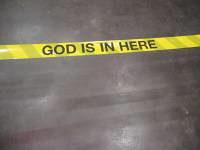Faith of a Culture Warrior, or why the cigarettes and booze
Mother, stop reading. This goes down as a public confession. Kudos to Jory, who asked a good question.
Liberal Academic Christians are rare, but deconstructionist-obsessed, alcohol-swilling lovers of dance who attend church however hungover, those are rare indeed. I get asked about it a lot. I don't know what sort of an advocate I am for the One God or the True Cross. I'm a historian, not a priest: I don't have to live a model life, and I'm not interested in holding myself up as a model of salvation and rectitude. I live a private life where the Church has always been important, and I've typically been reluctant to speak about those interior transformations for fear of being mistaken for one of the Bible-thumping convert-monkeys. But there's a time and a place for speaking about the interior life in public. Justice Sunday signalled to a lot of people that it was about time liberal Christians started talking. I can tell you what I think the Church means to me, and what the Church means to America.
I spent most of my education among East coast meritocrats for whom giving up God and other mythologies was a huge part of their initiation into the power machine. From a pragmatic level it's unwise to have an elite that disconnected with the experiences of the rest of the country. The Christian middle needs to reclaim its public face from the reactionaries who have co-opted the name of the church.
But more important by far is how one's actions, beliefs, and every-day kinds of thoughts coaelsce with one's beliefs about the world. The mathematicians and historians I've known have always been angry atheists, wanting to build everything from the ground up in each generation, willing to dismiss collective, thousand-year-old rituals to the position of performance art, in the hopes that individuals would then wake up from the moment and start thinking for themselves. A different kind of historian and a most astrophysicists I know have been theists of a certain kind, in awe of the limits of knowledge. From the standpoint of a certain kind of folklore and anthropology, I have no words to describe the power of collective languages to describe aesthetic or spiritual experience. Art for art's sake doesn't get me there. Art as individual genius doesn't make sense to me -- I spend too much time looking at how genius borrows from the collective. The collective as point of access to a reality that transcends the human -- there's where I stand happy. Maybe my reverence has a little bit of Ludwig in it too.
One of the first points is basic: Tillich says that there can be no such thing as an atheist human, because to be human is to feel attached and aesthetic urges beyond anything that adheres in the material worth of the thing.
But Tillich's an atheist's theologian. Why the tradition? Maybe because we think more nuancedly through traditions, because all sorts of revelations come through them: the history of our language, our idea of self and society. Enlightenment said we broke free and could start all over again, but historians of the Enlightenment love proving how that revolution got bogged down in exactly the same hierarchies as before.
Inside the tradition itself there are hundreds of compensations, contradictions, disavowals, excuses, escapes for subverting hierarchy and providing alternatives. I don't have total faith in the tradition, but I have less faith in the power of Enlightenment to set us free from the self, or from the banality of a material existence not worth having. And finally, why the tradition; because in every encounter with the meritocracy, success, praise, innovation, creativity, and reward, I find myself sick with loneliness, and dizzy from not being able to share my stories. In the language of tradition that awful loneliness is relieved, if only for a couple of hours every week. I'm too human and I can't escape from it.
Part of coming to terms with that was to swear off my parents' puritan boot-strap ethics and dive into alcohol, tobacco, and caffeine, nothing harder or softer, but drugs that fix me to the moment, remind me daily of my fragility. Because without them I spin into paranoid fits of imagining that this one career, person, or event is going to be the one, the only one, that can save me. As an aside, I gave them all up for Lent as a way of testing my dependence, or maybe trying to make more internal sense. I spent two months in blizzarding Connecticut without the drugs, without friends, plowing out buckets of research, coming face to face with every paranoid fear I've ever had in my life. So what: coming back to California was like diving into warm water, and having acknowledged how weak and lonesome and pointless I could feel by being nothing but a research machine, it was nice to come back, drink a whisky, light a cigarette, and talk about seizing the day. But I also find that I'm more on tea than coffee, am happier without dehydration, smoke rarely, and drink when there's company. All pretty modest these days really. But I take comfort in knowing that there's the out, when I'm too much in my own head.











0 Comments:
Post a Comment
<< Home